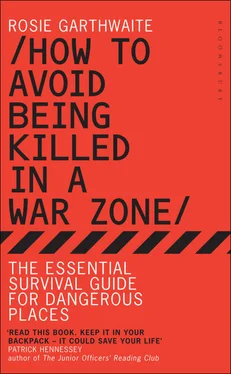When taking a taxi, sit in the back. That way you can sort your money out in secret. Never flash your cash, and try to keep controversial chat to a minimum. Remember, the driver knows where you live.
If you want to keep your address a secret, get the driver to stop at a hotel or restaurant nearby, wait until he’s gone, then walk the rest of the way.
I am sure that being able to bribe people is a skill you are born with – or not, in my case. There are six-year-olds who are better than me at bribing officials to get what they want. I know how to flirt my way into most things, including trouble. But that is not always the most sensible option. In many, if not most, developing countries bribes oil the wheels. And knowing when you need to pay baksheesh , as it is called in Arabic-speaking countries, who to pay and how to do it effectively is something learnt over time. I can but imitate the masters who are born with a fully developed bribery muscle.
Marc DuBois, who works for Médecins Sans Frontières, says: ‘MSF doesn’t use bribery, but in my earlier travels I sometimes found small gifts useful. However, you need to be subtle and approach with caution. Maybe suggesting a brand new pair of sports socks are “difficult to fit into your bag” as a security guard goes through your luggage. It’s understood what the bargain is, but isn’t clearly stated.
‘Don’t embarrass people by trying to bribe them openly – it can backfire. They can pretend to be highly upset, charging you with the crime of bribery in order to jack up the amount. On one occasion, when I was working with the Peace Corps, I had a visa or permit that wasn’t quite right. I was prepared with a $20 bill neatly folded in my pocket. I slipped it into the right page and asked the guard to check my permit again to see if it was in order.’
Samantha Bolton has some other tips: ‘When it comes to getting that last seat on a plane, girls should wear a short skirt or deep v-neck – if dealing with disciplined soldiers. Be friendly, polite and respectful with others. Offering corporate gifts, pens or trinkets also helps. This last one is more for getting through roadblocks. Medicine too is always in demand – antibiotics, antiseptic, painkillers. And, of course, cigarettes.’
In the United States tipping is a sport. But in many parts of the world it’s an art. An open display of generosity is frowned upon in some parts of the Middle East and China, while other places applaud displays of wealth and philanthropy, on however small a scale.
People in many parts of the developing world are often paid little and kept on a tight employment leash through a bonus system (just like those who wait tables in the USA). As a visitor, you will be expected to tip. But as my good friend and colleague Stefanie Dekker found out on her first trip to Iraq, it is how you do it that counts:
‘I was in Halabja with two Peshmerga bodyguards. I wanted to give them both a big tip after a long day in the mountains. I handed over the money – it wasn’t obvious, but it wasn’t subtle in the slightest. They shouted, “No, no, no – we couldn’t!” I know now that you have to fold the cash into a tiny square or scrunch it into a ball and hand it over very carefully at the right time to avoid offence. Of course, they took the money later.’
/DEALING WITH SURVEILLANCE
One former UN worker tells me: ‘In countries such as Sudan they like to observe in a very obvious 1970s’ sitcom way – blacked-out windows, aviator sunglasses, kerb-crawling behind you… It can be fun to lead them on a merry little dance.’
But keeping an eye on people doesn’t always mean cloak and dagger stuff: it’s as much about your nosy neighbours or a potential house burglar as it is about government surveillance. If you think anyone would be interested in your movements and you are a potential target, there are some obvious first precautions to take.
Make your movements unpredictable:change your routes and travel times daily; find six routes to work and roll a dice each day to choose one; switch vehicles occasionally; send out your normal vehicle as a decoy; occasionally stay in a hotel or with a friend overnight.
Use several different phones and SIM cards.Keep one of each purely for emergency calls that the surveillance people will never have heard you use before. Avoid using a landline.
Whenever possible, use third parties to meet people.Send written or recorded messages via your carefully chosen go-between.
If you have to meet people yourself, do so in public places – a park, or a café or restaurant with large windows on three walls.
Open and close new e-mail addresses every dayif you have to. Communicate a code to your contact so they know what the next e-mail address will be.
Radio producer Shadi Alkasim recommends: ‘Try to send any important documents, video or audio clips you have acquired out of the country immediately. Do not keep them with you as they may put your life in danger, or get you arrested.’
Turn on loud music before making any callsif you suspect the line is bugged.
Assume that your computer and instant messaging are insecure.A keystroke copier might have been installed on your computer.
‘Clean’ your communications equipment.Delete anything ‘dodgy’ from your phone and laptop, including online instant messaging. Delete messages and ‘last calls dialled’ daily.
Give contacts different names in your phone.Labels such as ‘Home’, ‘Mum’ or ‘Dad’ should not be real. Place the number of your security guard under those labels, or the number of a friend whom you have briefed to know you are in trouble if someone strange calls.
Leith Mushtaq has a warning for anyone who is working with both sides in a conflict: ‘Potential enemies have intelligence-gathering abilities beyond your wildest imagination. Assume you are being watched and be cautious who you talk to about your mission. Avoid government or local contacts unless absolutely necessary. Retain your independence. Any mistake, any contact with the wrong person, and no one will trust you.’
Mohammad Tahir Luddin is one of a handful of eminent Afghan journalists working in Kabul. Or at least he was until he fled after being held for seven months in captivity by the Taliban with a New York Times reporter, David Rohde. When it comes to being observed, he has some clear advice for anyone visiting Afghanistan:
‘Be careful with your words. Stay independent. That is the only way to protect yourself from being kidnapped, killed or tortured. People working in war zones should not repeat the words of their government – “terrorist”, “dictator”, “terrorism” – as some US media do. These are government judgements. People attack journalists because they are biased. You can call the Taliban what you like if it is properly sourced to someone else. They won’t mind and they won’t pin it on you.’
Sebastian Junger’s work has inspired a generation of storytellers. His reporting of the Afghan War in particular hit me hard, with its vivid illustration of the well-equipped, professional US soldier’s struggle in the face of guerrilla-style warfare against an invisible army. He has some advice on how to avoid unnecessary suspicion in countries where paranoia and conspiracy theory are rife:
‘In Liberia I was accused of being a spy. The US embassy got me out. It’s easy to be accused of being a spy. Be very, very careful with all your e-mail…there’s no reason why the security won’t ask you open your accounts. Take care to clear your phone of texts too. A friend in Lebanon got into serious trouble over a racy SMS text. Be aware that the government may be monitoring your e-mail or phones. Delete all signs of military or intelligence contacts before you arrive.
Читать дальше




![Джонатан Димблби - Barbarossa - How Hitler Lost the War [calibre]](/books/385421/dzhonatan-dimblbi-barbarossa-how-hitler-lost-the-w-thumb.webp)







